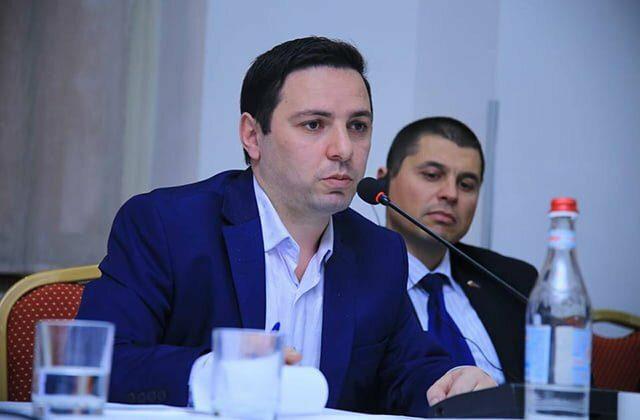
There is serious pressure on Aliyev to meet with Pashinyan, but the signing of the "peace treaty" is unrealistic. political scientist
The interlocutor of "Detq" is political scientist Armen Vardanyan.
"The Munich Security Conference ended, within the framework of which the meeting of the RA Prime Minister Nikol Pashinyan with the President of Azerbaijan Ilham Aliyev took place, with the mediation of Germany. Taking into account the fact that Azerbaijan refused to meet with the leader of Armenia on European platforms for a long time, what can be expected from these developments, does this meeting mean the resumption of negotiations on the "peace treaty"?
"Yes, I think that the negotiations, will continue, especially since the leaders of the two countries have agreed to hold new meetings at the level of ministers of mutual affairs, but in the end, probably, that agreement will not be signed for various reasons.
"Aliyev, as I have said many times, is not so interested in signing the "peace treaty", and here I see two reasons. First of all, Aliyev promised Putin that he will sign a "peace agreement" only on the Moscow platform and under no circumstances will he sign it on the Western platforms, therefore Aliyev will either torpedo the mediations of the Western states in this regard, or he will delay it. The second reason is that he understands that Armenia is still weak after the war, and while he has the chance, he will try to take much more from Armenia. For this reason, he also raises the issue of enclaves, brings new demands, trying to get more from Armenia."
"There was a lot of talk about what Aliyev agreed to meet with Pashinyan in Munich, taking into account that for a long time, all previous initiatives to meet on Western platforms were rejected by the dictator of Baku. According to you, why did Aliyev agree to meet with Pashinyan in Munich anyway?"
"One thing is obvious: there is a very serious pressure on Azerbaijan to meet with the leadership of Armenia on Western platforms. It is also not a coincidence that hearings were recently held in the US Senate with a very apt name: "The situation in Nagorno-Karabakh", and with this the US Senate also sent serious messages to Azerbaijan that their joint activities with Russia are not liked by the official Washington, and yes. there is pressure on him for Aliyev to come and meet with Pashinyan and sign a "peace agreement". As you mentioned, Aliyev avoided several such meetings in recent months. the meetings in Washington, Brussels, and Granada never came true, and now, it seems, Azerbaijan has given way in this regard, although there is a delicate moment here: Aliyev avoids meetings especially in the presence of French President Emmanuel Macron."
"The Munich meeting was initiated by Germany, and Germany does not put as much pressure on Aliyev as, say, Macron, and they agreed on this issue, taking into account Macron's absence. Let's remember that Macron promotes the point of view that the Armenian population deported from Karabakh should return to Artsakh under international monitoring. I emphasize: international monitoring, which the leader of Azerbaijan resists in every possible way. Now Scholz is not such a strong character as Macron to put serious pressure on the leadership of Azerbaijan, that's why Aliyev participated in this meeting initiated by Scholz."
"Just a few days ago, an incident took place on the border of Armenia and Azerbaijan, in one of the nearest positions of Inner Hand, and there is an opinion that this provocation by Baku was a message to the European observers stationed on the border. How about this?"
"Azerbaijan will constantly look for an opportunity to beat us, to prevent us from standing up, to develop, to become strong, and they will provoke escalations at the borders at every possible opportunity. As I have mentioned many times, Russia and Azerbaijan do not like the fact of EU observers being stationed on the border of Armenia, and they are very synchronized in their actions trying to discredit the observation mission. By the way, they were joined by the "fifth column" operating in Armenia."
"That observation mission is a deterrent factor for Azerbaijan. Since they were deployed in different parts of the border after the September 2022 aggression, in accordance with the agreements formed as a result of the Prague meeting, border clashes and incidents have significantly decreased. In other words, they are a restraining factor here, which, naturally, Azerbaijan and Russia do not like, and they are trying to discredit the group carrying out the observation mission."
"In your opinion, was the leadership of Armenia able to present Armenia's security problems on this European platform, and according to you, will the West eventually start to put real pressure on Azerbaijan, apart from calls and exhortations?"
"In fact, this conference was dedicated to the problems of Ukraine, in general, at this moment, the attention of the whole world is directed to Ukraine, and the problems of Armenia and other countries seem to have been pushed into the background. But it is not excluded that issues related to the security of Armenia were discussed during the personal meetings, and these discussions may contribute to the increase of that security.
As for the actions of the West, yes, it is not excluded that it will change and become tougher, but the work of our diplomacy in this direction is especially important here."
Add new comment